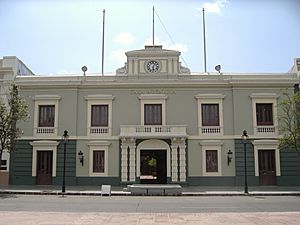Municipality facts for kids
A municipality is like a local government area. It's a part of a country or state that has its own rules and leaders. Think of it as a town or city, or even a group of villages, that manages its own local affairs.
Sometimes, "municipality" can also mean the group of people who run that local government. It's different from a special group that only handles one thing, like water or schools.
The word "municipality" comes from an old French word, which came from a Latin word, municipalis. This Latin word was about communities that helped ancient Rome. In return, these communities got to keep some of their own local governments.
A municipality can be any size, from a whole country like the Principality of Monaco to a small village.
The area a municipality looks after can be:
- Just one place, like a city, town, or village.
- Several places together (for example, some areas in New Jersey or Mexico).
- Only parts of a city, like the different boroughs in Santiago, Chile.


Contents
What are Municipalities Called in Different Countries?
Different countries use different names for their local government areas.
Municipality (and similar words)
Many countries use words that sound like "municipality." These often refer to the area or its political setup.
- In Brazil, a município is the local government. It's the smallest area with its own leaders and laws. People often use "municipality" and "city" to mean the same thing, but the "city" is actually the main town of the municipality.
- In Spain and Chile, they use municipio or municipalidad.
- In Portugal, they use município.
Commune (and similar words)
In many countries, words like "commune" are used. These often refer to the community of people living in the area and their shared interests.
- In France, Italy, Angola, and Romania, they use words like commune or comune.
- In Sweden, Norway, and Denmark, they use kommun.
- In the Netherlands and Belgium, they use gemeente.
- In Germany, they use Gemeinde.
- In Finland, they use kunta.
Other Terms
- In Greece, they use Demos, which means 'community'. This word is also part of "democracy," meaning 'rule of the people'.
- In Moldova and Romania, they have municipalities (for cities) and communes (for rural areas). A commune can even be part of a municipality.
English-Speaking Countries
- In Australia, they use the term local government area (LGA). This covers areas where local governments are in charge.
- In Canada, local governments are set up by provincial laws. They can be called cities, towns, villages, or even rural municipalities. Some provinces, like Ontario, have different levels of municipalities.
- In India, a municipality is a local body that manages a city or town, usually with a population of 100,000 or more. They have elected leaders like a mayor and councilors.
- In the United Kingdom, the term "municipality" was used for cities or towns with self-government until the 1970s. Now, they are called districts or council areas. A district can still be called a borough or city.
- In Jersey, a municipality refers to the elected officials who run each of the 12 parishes.
- In Trinidad and Tobago, a municipality is a city, town, or other local government unit.
- In the United States, a "municipality" usually means a city, town, or village that has its own local government.
Chinese-Speaking Countries
- In China, a direct-administered municipality is a big city that has the same status as a province. Examples include Beijing, Chongqing, Shanghai, and Tianjin.
- In Taiwan, a special municipality also has the same status as a province. Examples include Kaohsiung and Taipei.
Municipalities Around the World
Here are a few examples of how municipalities work in different countries:
| Country | Local Term | What it is | How many | Interesting Fact |
|---|---|---|---|---|
| Brazil | município | A local government area. | 5,570 | Each municipality usually has a city part and a rural part. |
| Croatia | Općina | A local government area, part of a county. | 428 | Most municipalities are named after their main village. |
| Greece | Deme / Δήμος | A local government area. | 332 | A municipality is often divided into smaller units called Municipal Units and Communities. |
| Italy | municipio | A subdivision of a larger city or a local government area. | 9 for Milan, 15 for Rome | The word municipio can also mean city hall. |
| India | municipality (nagar palika) | An urban local body that governs a town or city. | Varies by state | They have elected bodies with a mayor and councilors. |
| Philippines | bayan or munisipyo | The official name for a town, divided into smaller areas called barangays. | 1,488 | Larger municipalities can become cities. |
| Portugal | município | A local government area, usually named after its biggest town. | 308 | Municipalities are often much larger than the city they are named after. |
| Puerto Rico | municipio | A local government area with an urban part (city/town) and surrounding rural areas. | 78 | It has an elected mayor and administration. |
| Sweden | kommun | A local government area that is independent from regions and counties. | 290 | Before 1971, they were called cities, market towns, or rural municipalities. |
In Portugal, they use two different words: concelho for the territory and município for the government body. But in Brazil, município means the territory, and prefeitura is the government office.
See also
 In Spanish: Municipio para niños
In Spanish: Municipio para niños
 | Jackie Robinson |
 | Jack Johnson |
 | Althea Gibson |
 | Arthur Ashe |
 | Muhammad Ali |

